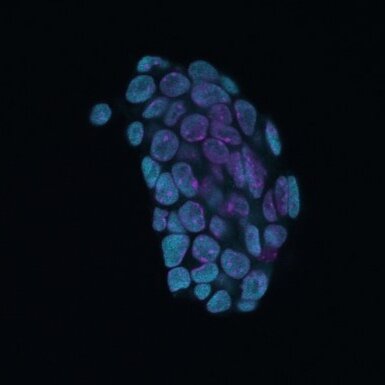epigenetic plasticity in development and cancer
Epigenetics provides a stable cell identity while priming cells for change. During embryonic development the epigenetic plasticity of cells is tightly controlled and regulated in part by priming factors. These establish a permissive epigenetic landscape to enable future transcriptional changes. Cancer cells frequently have a distorted cell identity and adapt epigenetic, transcriptomic and phenotypic properties associated with embryonic cells. By discovering the principles driving epigenetic plasticity in development, we can further our understanding of how this goes awry in cancer, leading to new areas for therapeutic intervention.

areas of research
hijacking developmental epigenetic plasticity in cancers
Epigenetic plasticity of the chromatin and DNA methylation landscapes impacts the ease by which a cell can initiate new transcriptional programmes in response to external cues such as differentiation signals or changes in its environment. In stem cells, increased epigenetic plasticity is reflected by specific chromatin landscapes and transcriptional profiles. We are using these signatures to determine the prevalence of epigenetic plasticity in cancers and how these impact patient outcomes.
dynamics and regulation of bivalent chromatin
Bivalent chromatin is a unique epigenetic state characterised by coincident active and repressive histone modifications at gene promoters. It is postulated that bivalent chromatin keeps these promoters poised and amenable for future activation. While bivalent chromatin has been implicated in cancers the majority of our understanding comes from embryonic stem cells. We are developing new high-resolution methods to profile bivalent chromatin at high-molecular resolution and also in live single-cells to accurately map the dynamics and distribution of this chromatin state and uncover its regulation, resolution and significance on cell state transitions in both development and cancer models.
discovery of novel epigenetic priming factors
Epigenetic priming factors are responsible for setting up a permissive epigenetic landscape early in development that is not required until later timepoints. We identified Dppa2 and Dppa4 as epigenetic priming factors in stem cells. Here they are required to establish a permissive chromatin landscape at key developmental promoters, poising them for future gene activation during differentiation. We are using high-throughput screens to discover new epigenetic priming factors in stem cells and cancer cells. We then apply classical and emerging new cell and molecular biology techniques to uncover how they function mechanistically.
drivers of cancer cell plasticity
Cancer cells are dynamic and heterogeneous and contain subpopulations of highly plastic cells that are more aggressive and resistant to therapies. Cells can cycle in and out of this hyper-plastic state, however we do not know how or why these cellular transitions take place. We are coupling endogenous reporters of heightened plasticity with CRISPR screening technology to uncover regulators of cancer state transitions. This has important consequences for cancer evolution and adaptation, potentially impacting disease progression and patient outcomes.

